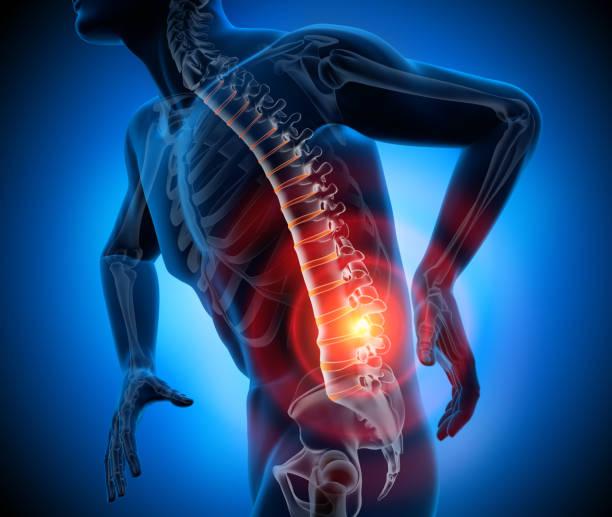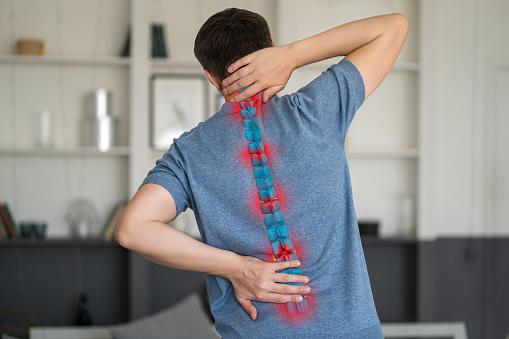How To Survive Herniated Discs
The bones in your back (vertebrae) are cushioned by discs. These small, round discs are shock absorbers for your vertebrae. They are located between each of the bones (vertebra) in your spinal column, and they allow you to bend, twist and turn with ease. Sometimes they become damaged or herniated.
Herniated discs are sometimes referred to as bulged, slipped, or ruptured discs because when one of the soft, rubbery discs cushioning your spine becomes damaged it bulges out of its normal position. This can cause pain, weakness, and numbness in the affected area, and can also cause problems with mobility and everyday activities.
How do they happen? There are several possible causes of a herniated disc, including injury, aging, and degenerative changes in the spine. Injuries can be caused by accidents, falls, or sports-related activities. As we age, our discs lose some of the fluid that makes them spongy resulting in making them flatter and harder. This is known as disc degeneration and can lead to weakening of the disc, and unfortunately, a herniation.
During the aging process, discs lose some of the fluid that makes them spongy resulting in making them flatter and harder. This is known as disc degeneration and can lead to herniations
The other causes of herniated discs are injuries to the spinal vertebral joints that result in one of the small discs tearing or leaking. When this leaking occurs, it can aggravate a nerve resulting in back pain, and sometimes, pain and nerve symptoms in your leg. 2% of the general population get herniated discs. It most often affects people between the ages of 30 and 50. Women are affected half as much as men are.
The symptoms of a herniated disc can vary greatly. It could be a low backache or no pain if the herniated disc isn’t pressing on a nerve, or the patient could be experiencing numbness or weakness. Often the herniated disc produces sciatic pain which shoots down one side of the buttocks and into the leg or the foot. For Cervical spine (neck) disc herniations, it is also quite common for the patient to feel pain and/or tingling between the shoulder blades, arm, and sometimes the hand. This is the point where you need to call Livingston Chiropractic.

Chiropractic medicine is a major treatment option for people with herniated discs. Dr. Livingston specializes in the diagnosis and treatment of musculoskeletal conditions, this includes herniated discs. At Livingston Chiropractic, patients can expect to receive personalized care that is both professional and warm and friendly.
One of the key benefits of chiropractic care for herniated discs is that it is non-invasive and does not involve the use of drugs or surgery. Instead, Dr. Livingston uses hands-on techniques to help alleviate pain and promote healing, including spinal adjustments, massage therapy, and physical therapy exercises. He works with each patient to develop a customized treatment plan that takes into account their individual needs and preferences.
Two of the techniques Dr. Livingston could provide are: (1) Spinal decompression therapy which reduces the pressure on your discs. Dr. Livingston will put you on a special table. The treatment applies a light force on the affected area with a slow, cyclic pumping rhythm. It is gentle and pain-free, and many patients find it relaxing. The result is the movement of the affected area away from the nerve and the relief of your pain. It usually takes a series of treatments. Sometimes Dr. Livingston will add muscle stimulation and nutritional recommendations. (2) Pelvic Blocking Treatments. With this treatment Dr. Livingston uses cushioned wedges placed under both sides of your pelvis. This placement naturally draws your herniated disc away from the affected area.
In addition to providing treatment for herniated discs, Livingston Chiropractic also offers preventative care to help patients maintain good spinal health and reduce their risk of developing herniated discs in the future. This can include regular spinal adjustments, exercises to improve posture and flexibility, and advice on proper lifting techniques and other activities that can put strain on the spine.
Overall, herniated discs can be a painful and debilitating condition, but Livingston Chiropractic will treat your herniated disc with the expertise and compassion that we are known for.
Don’t try and bear your pain, get relief by calling Livingston Chiropractic at 440-528-0005 ext1.

 Chiropractic medicine is a major treatment option for people with herniated discs. Dr. Livingston specializes in the diagnosis and treatment of musculoskeletal conditions, this includes herniated discs. At Livingston Chiropractic, patients can expect to receive personalized care that is both professional and warm and friendly.
Chiropractic medicine is a major treatment option for people with herniated discs. Dr. Livingston specializes in the diagnosis and treatment of musculoskeletal conditions, this includes herniated discs. At Livingston Chiropractic, patients can expect to receive personalized care that is both professional and warm and friendly.